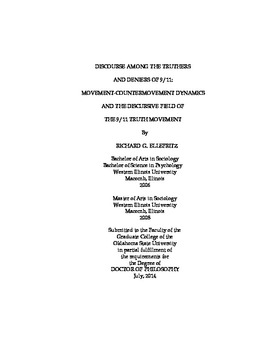| dc.description.abstract | This study is based upon a three year ethnography with the 9/11 Truth Movement involving field work in their online and offline milieus. In addition, a critical discourse analysis of texts produced by their countermovement antagonists has been employed to highlight movement-countermovement interactional dynamics. The 9/11 Truth Movement questions the official and commonly agreed upon narrative of how the events of September 11, 2001, occurred. The questions are posed to the public, public officials, media, themselves, and to their countermovement antagonists. For posing such questions as, "Did you know a 3rd tower fell on 9/11," and asking why the collapse of World Trade Center Building 7 was excluded from The 9/11 Commission Report, countermovement antagonists employ the conspiracy label. Terms such as "conspiracy theorists," "conspiracy theories," "conspiracists," and "conspiracism" are regularly used to discredit the 9/11 Truth Movement and its members. The 9/11 Truth Movement's members and countermovement antagonists recognize the discursive function of the conspiracy label, which is to limit debate and impede critical attention to the movement's empirical claims about the problematic nature of the events of September 11, 2001. The present study emphasizes the presence of a discursive field in the movement's public problems marketplace that tilts an already unlevel communicative environment further in disfavor of the 9/11 Truth Movement. Continued use of the conspiracy label to categorize and discredit people who doubt or who ask socially disturbing questions about official stories, like that found in The 9/11 Commission Report, undermines ethical treatment of human subjects in the social and behavioral sciences, and it threatens to disrupt communicative actions and the free flow of information necessary for democracies to function. Unless their empirical claims can be proven false, "conspiracy theorist" is nothing less than a derogatory slur used to avoid direct, rigorous assessment of troubling arguments that potentially uncover systemic forms of corruption, domination, and oppression. | |
